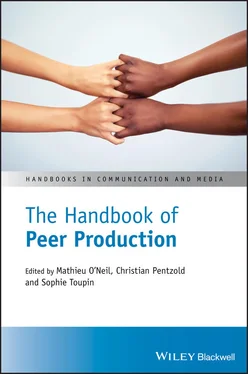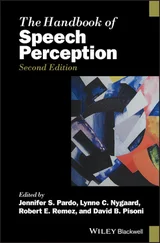In this ongoing transformation, standards in Wikipedia have, for instance, changed from “folksy ‘description of how we do things’” to “punitive ‘the way one must do things because otherwise they will punish me’,” Lih (2009, p. 224) claimed. Being aware of these tendencies of increasing formalization, the editors of the online encyclopedia have also devised the somewhat paradoxical rule to “Ignore all rules.” It states that if a rule hinders users from improving Wikipedia it should be willfully ignored. The call to be bold and edit thus seeks to balance mushrooming specifications with the vital commitment to openness. Interestingly, this principle is not found in all Wikipedia language versions, which points to the heterogeneity of the arrangements prevalent among the myriad endeavors that make up peer production. There are forms of isomorphism where different projects follow connate social norms and rules as well as distinct institutional settings peculiar for an individual enterprise.
A blueprint for the future design and implementation of peer governance is arguably provided by Elinor Ostrom’s (1990) principles of successful common‐property regimes. They are a key reference for analyzing the provision and allocation of shared resources in “settings in which the individuals involved have exercised considerable control over institutional arrangements” (p. 61). Sustainable, long‐term settings rest on the congruence between institutions and local conditions. They are marked by collective choice arrangements where people affected by rulings should also participate in their formulation and enforcement. This kind of reciprocal responsibility also ought to foster the monitoring and conflict resolution mechanisms. Graduated sanctions allow community members to adapt penalties in accordance with the severity of wrongdoings. Ostrom furthermore points to the need for local enforcement where communal jurisdiction is recognized by external authorities, and she underscores the importance of multiple layers of organization and governance. In effect, commons‐based projects form a type of nested enterprises where productive participation is arranged at different levels that reach from small circles to the entire community.
With these directions for successful mutual and inclusive governance beyond markets or firms, Ostrom’s work on property‐rights regimes seems to be a natural fit. Indeed, many peer production projects have sought to emulate some of her advice (Aaltonen & Lanzara, 2015; Forte & Bruckman, 2008; Keegan & Fiesler, 2017; Kiesler et al., 2011; Pentzold, 2011; Viègas et al., 2007). Yet while Ostrom deals with the allocation and provision of scarce natural resources, peer production mostly centers on information goods whose use is nonrival (Hess & Ostrom, 2011). In consequence, urgent issues revolve around the creation of common resources, not their consumption. This is unfinished business. In order to expand and reinforce the collective capability of contributors, peer production’s institutions have to be continuously aligned with the dynamically unfolding conditions and requirements of its projects.
1 Aaltonen, A., & Lanzara, G. F. (2015). Building governance capability in online social production. Organization Studies, 36(12), 1649–1673.
2 Ayers, P., Matthews, C., & Yates, B. (2008). How Wikipedia works. And how you can be part of it. San Francisco, CA: No Starch Press.
3 Baym, N. (1996). The emergence of community in computer‐mediated communication. In S. G. Jones (Ed.), Cybersociety (pp. 138–163). London: Sage.
4 Berger, P., & Luckmann, T. (1966). The social construction of reality. New York, NY: Penguin.
5 Berlin, I. (1969). Four essays on liberty. Oxford: Oxford University Press.
6 Beschastnikh, I., Kriplean, T., & McDonald, D. W. (2008). Wikipedia self‐governance inaction. Proceedings International Conference on Weblogs and Social Media, Seattle, WA (pp. 1–9).
7 Bruns, A. (2008). Blogs, Wikipedia, Second life, and beyond. New York, NY: Peter Lang.
8 Bryant, S. L., Forte, A., & Bruckman, A. (2005). Becoming Wikipedian. Proceedings 2005 International ACM SIGGROUP Conference on Supporting Group Work, Sanibel Island, FL (pp. 1–10).
9 Butler, B., Joyce, E., & Pike, J. (2008). Don’t look now, but we’ve created a bureaucracy. Proceedings SIGCHI Conference on Human Factors in Computing Systems, Florence, Italy (pp. 1101–1110).
10 Carr, N. (2011). The shallows. New York, NY: W. W. Norton.
11 Coleman, G. (2013). Coding freedom: The ethics and aesthetics of hacking. Princeton, NJ: Princeton University Press.
12 Dahlander, L., & O’Mahony, S. (2011). Progressing to the center. Organization Science, 22(4), 961–979.
13 de Laat, P. (2007). Governance of open source software. Journal of Management & Governance, 11(2), 165–177.
14 DiMaggio, P. J., & Powell, W. W. (1991). Introduction. In W. W. Powell & P. J. DiMaggio (Eds.), The New Institutionalism in Organizational Analysis (pp. 1–38). Chicago, IL: University of Chicago Press.
15 Firer‐Blaess, S., & Fuchs, C. (2014). Wikipedia: An info‐communist manifesto. Television & New Media, 15(2), 87–103.
16 Fish, A., Murillo, L., Nguyen, L., Panofsky, A., & Kelty, C. (2011). Birds of the internet. Journal of Cultural Economy 4(2), 157–187.
17 Forte, A., & Bruckman, A. (2008). Scaling consensus: Increasing decentralization in Wikipedia governance. Proceedings of Hawaiian International Conference of Systems Sciences (HICSS), Waikoloa, HI (pp. 1–10).
18 Forte, A., Larco, V., & Bruckman, A. (2009). Decentralization in Wikipedia governance. Journal of Management Information Systems, 26(1), 49–72.
19 Geiger, S. R. (2017). Beyond opening the black box. Big Data & Society, July–December 2017, 1–14. doi:10.1177/2053951717730735.
20 Geiger, S. R., & Ribes, D. (2010). The work of sustaining order in Wikipedia. Proceedings ACM Conference on Computer Supported Cooperative Work, Savannah, GA (pp. 117–126).
21 Giddens, A. (1984). The constitution of society. Cambridge: Polity.
22 Halfaker, A., Geiger, S. R., Morgan, J., & Riedl, J. (2013). The rise and decline of an open collaboration system. American Behavioral Scientist, 57(5), 664–688.
23 Hall, P. A., & Taylor, R. C. R. (1996). Political science and the three new institutionalisms. Political Studies, 44(5), 936–957.
24 Hess, C., & Ostrom, E. (2011). An overview of the knowledge commons. In C. Hess & E. Ostrom (Eds.), Understanding knowledge as a commons (pp. 3–26). Cambridge, MA: MIT Press.
25 Jemielniak, D. (2016). Wikimedia movement governance. Journal of Organizational Change Management, 29(3), 361–378.
26 Jepperson, R. (1991). Institutions, institutional effects, and institutionalization. In W. W. Powell & P. J. DiMaggio (Eds.), The new institutionalism in organizational analysis (pp. 143–163). Chicago, IL: University of Chicago Press.
27 Keegan, B., & Fiesler, C. (2017). The evolution and consequences of peer producing Wikipedia’s rules. Proceedings of the 11th International AAAI Conference on Web and Social Media, Montréal, Canada (pp. 112–121).
28 Kesan, J. P., & Shah, R.C. (2005). Shaping code. Harvard Journal of Law & Technology, 18, 319–400.
29 Kiesler, S., Kraut, R. E., Resnick, P., & Kittur, A. (2011). Regulating behavior in online communities. In R. E. Kraut & P. Resnick (Eds.), Building successful online communities (pp. 125–178). Cambridge, MA: MIT Press.
30 Konieczny, P. (2009). Governance, organization, and democracy on the Internet. Sociological Forum, 24(1), 162–192.
31 Konieczny, P. (2010). Adhocratic governance in the Internet age. Journal of Information Technology & Politics, 7(4), 263–283.
32 Kostakis, V. (2010). Peer governance and Wikipedia. First Monday, 15(3). Retrieved from http://firstmonday.org/ojs/index.php/fm/article/view/2613/2479
Читать дальше


![О Генри - Справочник Гименея [The Handbook of Hymen]](/books/407356/o-genri-spravochnik-gimeneya-the-handbook-of-hymen-thumb.webp)









